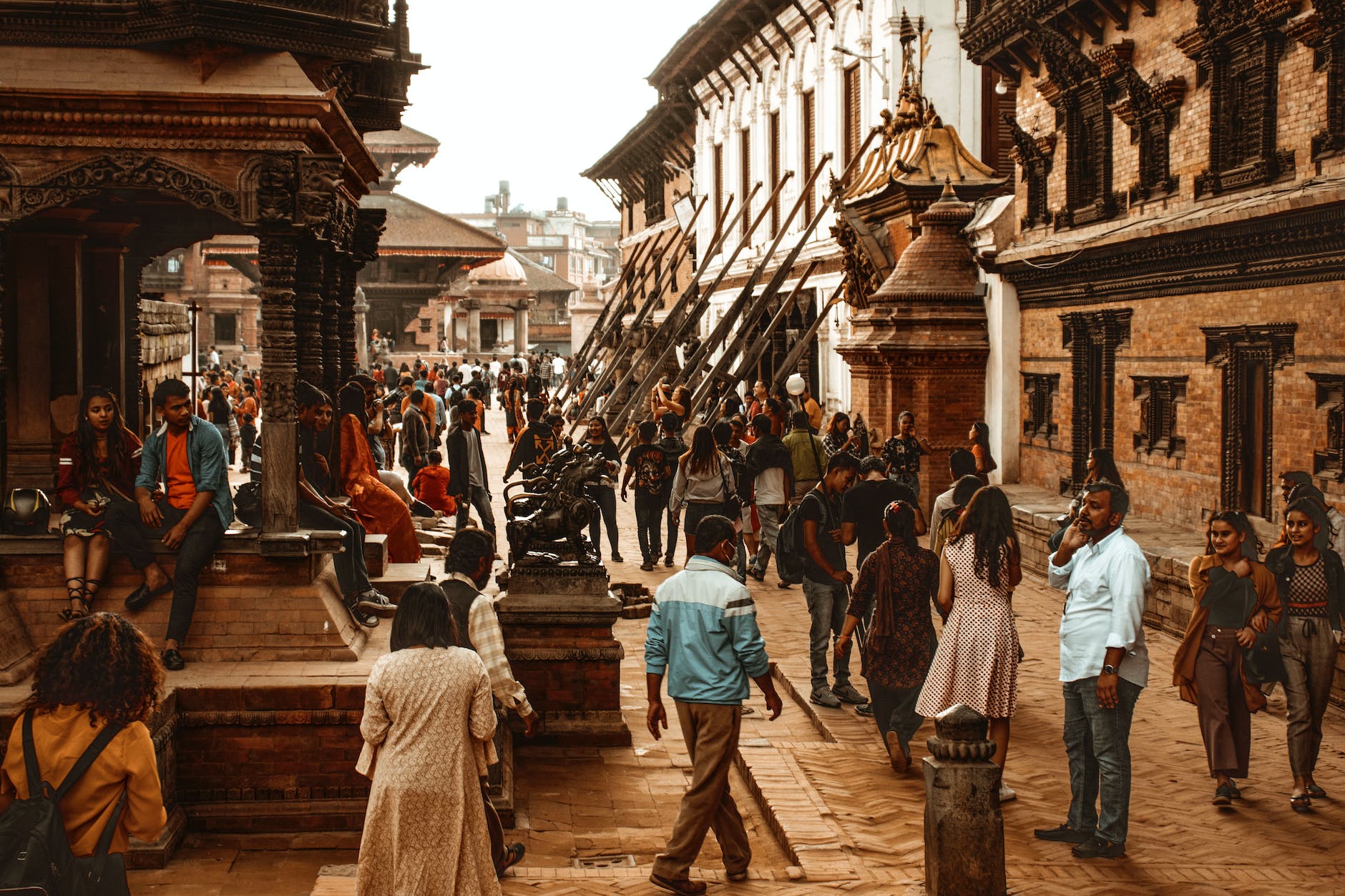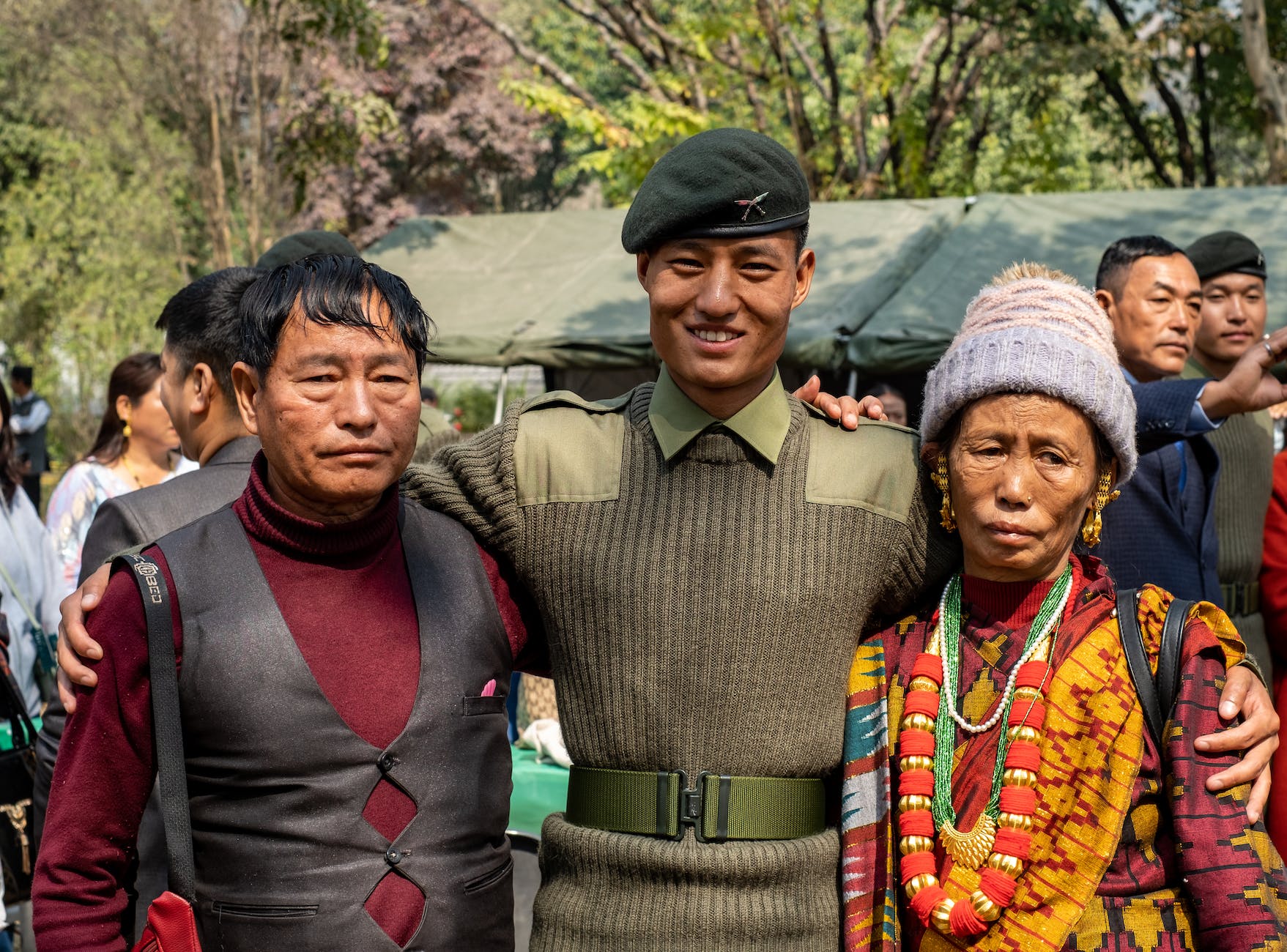All right, this web-page provide 350 Nepali Name and brief explanations for each of the names. Nepali names often intertwine with the country’s religious, linguistic, and cultural facets. This article sheds light on 200 such captivating traditional Nepali names for baby boy and baby girl, 100 modern Nepali names and wired Nepali nickname, primarily rooted in Hindu traditions, and their meanings.
Table of Contents
100 Nepali Name for Baby Boy
- Aarav: Means “peaceful” or “melodious music.” Popular in modern times.
- Abhishek: Refers to an initiation or anointment ceremony. Not a character but a sacred ritual in Hinduism.
- Aditya: The Sun. While Adityas are a group of solar deities in Vedas, it’s a common name for boys.
- Aman: Means “peace.” Modern and popular name.
- Anish: “Supreme; unobstructed.”
- Ankit: “Marked.” Common in modern times.
- Anup: “Incomparable.” Popular in Nepal but not directly from scriptures.
- Arjun: A prince and archer from Mahabharata. A central character and friend of Lord Krishna.
- Ashish: “Blessings.” General positive name.
- Avash: Likely denotes “invincible.” Popular in Nepal.
- Ayush: “Age” or “lifespan.” Represents long life.
- Bimal: “Pure.” Holds a positive connotation.
- Bishal: “Great” or “large.” Descriptive name.
- Bishnu: Variation of Vishnu, a principal deity in Hinduism.
- Bipin: “Forest.” Not directly from scriptures.
- Chirag: “Lamp.” Symbolizes light or guidance.
- Deepak: “Lamp” or “light.” Symbolizes enlightenment.
- Dhiraj: “Patience.” Represents calmness and steadiness.
- Dipendra: “Lord of lights.” Dipen means light, and Indra is a Vedic deity.
- Gaurav: “Honor” or “pride.” Holds a positive meaning.
- Gyanendra: “Lord of knowledge.” Gyan means knowledge.
- Hari: Name for Lord Vishnu or Krishna.
- Hemant: “Winter.” Also, a name of a season in the Indian subcontinent.
- Himal: Refers to the Himalayan range. Signifies strength and grandeur.
- Ishan: “Sun” or “northeast.” Represents a source of light.
- Jeevan: “Life.” A common name symbolizing vitality.
- Kabin: Possibly “serious” or “pledge.”
- Kamal: “Lotus.” Represents purity and beauty.
- Keshav: Another name for Lord Krishna.
- Kiran: “Ray of light.” Symbolizes hope and positivity.
- Krishna: Central figure in Mahabharata. Incarnation of Lord Vishnu.
- Kundan: “Pure.” Represents purity and clarity.
- Laxman: Lord Rama’s brother in the Ramayana. Represents loyalty.
- Madhav: Another name for Krishna.
- Mahesh: Another name for Lord Shiva.
- Manish: “Lord of the mind.” Represents wisdom.
- Manoj: “Born of the mind.” Represents intellect.
- Mohan: “Charming.” Another name for Krishna.
- Nabin: “New.” Signifies freshness.
- Naman: “Salutation.” Represents respect.
- Narayan: Another name for Vishnu.
- Navin: “New.” Represents novelty and freshness.
- Niraj: “Born from water.” Lotus-related significance.
- Nirmal: “Pure” or “clean.” Represents purity.
- Nishan: “Symbol” or “mark.”
- Om: Sacred sound in Hinduism.
- Pankaj: “Lotus.” Born from mud, symbolizing beauty from adversity.
- Paras: “Touchstone.” Represents alchemy and transformation.
- Parashuram: Sixth avatar of Vishnu. Warrior with an axe.
- Pawan: “Wind.” Also refers to Hanuman.
- Prabin: “Skilled” or “proficient.”
- Pradeep: “Light” or “lamp.”
- Prakash: “Light.” Represents enlightenment.
- Pramod: “Joy” or “happiness.”
- Prem: “Love.” A positive name.
- Pujan: “Worship.” Represents devotion.
- Raj: “King” or “rule.” Royal connotation.
- Rajan: “King.” Royal connotation.
- Rajendra: “King of gods.” Indra is king of the gods.
- Rajesh: “King of kings.” Royal connotation.
- Rakesh: “Lord of the night” or “moon.”
- Ram: Central figure in the Ramayana.
- Ramesh: Another name for Lord Vishnu.
- Ravi: The Sun.
- Rohit: “Red” or “horse.” Often associated with the sun.
- Rupak: “Sign” or “feature.”
- Samir: “Wind” or “morning breeze.”
- Sandesh: “Message.”
- Sanjay: “Victorious.” A character in Mahabharata.
- Santosh: “Contentment” or “satisfaction.”
- Saurav: “Fragrance.”
- Shambhu: Another name for Lord Shiva.
- Shashank: “Moon.”
- Shiva: Main deity in Hinduism.
- Shyam: “Dark-skinned.” Another name for Krishna.
- Siddhartha: Buddha’s name before enlightenment. Means “one who has achieved a goal.”
- Suman: “Flower” or “cheerful.”
- Suresh: “Lord of the gods.” Another name for Indra.
- Suraj: “Sun.”
- Surya: Sun God in Hinduism.
- Sushant: “Quiet” or “peaceful.”
- Sushil: “Good character.” Represents virtue.
- Swarup: “Form” or “appearance.”
- Tanka: Likely “anchor.” Represents stability.
- Tej: “Luster” or “radiance.” Represents energy and brightness.
- Tilak: A mark on the forehead. Religious significance.
- Ujjwal: “Bright” or “shining.”
- Umesh: Another name for Lord Shiva.
- Upendra: Another name for Lord Vishnu.
- Utsav: “Festival.” Celebratory connotation.
- Vivek: “Wisdom” or “distinction.” Represents clarity of thought.
- Yogesh: “Lord of Yoga.” Often associated with Lord Shiva.
- Yubaraj: “Crown prince.” Royal connotation.
- Yug: “Era” or “generation.” Time-related significance.
- Yuvraj: “Young prince.”
- Bipul: “Vast” or “plentiful.”
- Chandan: “Sandalwood.” Sacred wood used in rituals.
- Darshan: “Viewing” often in a religious context, like “having a vision of deity.”
- Naveen: “New.”
- Pushkar: A sacred lake in Rajasthan, also means “lotus.”

100 Nepali Name for Girl
- Aastha – Faith; Trust. While it’s a popular name, it’s not directly tied to any particular scriptural character.
- Anjali – Offering; Gesture of respect. Derived from Sanskrit, it symbolizes a gesture of prayer.
- Barsha – Rain. Signifying fertility and nature, not directly tied to scriptures but holds immense cultural significance.
- Binita – Modest; Humble. Not directly from scriptures but is popular in Nepal.
- Chhaya – Shadow. Not directly tied to any scriptural character.
- Deepa/Deepika – Lamp; Light. Symbolizes enlightenment but isn’t directly tied to a character.
- Esha – Desire; Purity. Popular modern name.
- Ganga – The holy river Ganga. Mentioned in various Hindu scriptures like the Mahabharata and Puranas.
- Himali – From the Himalayas. It’s culturally significant, representing Nepal’s topography.
- Indira – Another name for Goddess Lakshmi, from Hindu scriptures like Puranas.
- Jamuna – Another sacred river, representing purity.
- Kanchan – Gold. Symbolizes purity and value.
- Laxmi – Goddess of wealth, prosperity. Central figure in various Hindu scriptures.
- Manjari – A cluster of blossoms. Symbolizes beauty and growth.
- Namrata – Humility; Modesty. Not directly from scriptures but holds a positive connotation.
- Ojaswi – Bright. Represents radiance and charm.
- Pooja – Prayer; Worship. A sacred ritual in Hinduism.
- Radha – Lover of Lord Krishna. Central character in several texts like Bhagavata Purana.
- Sarita – Stream. Represents flow and nature.
- Tripti – Satisfaction. Not directly tied to any specific character.
- Uma – Goddess Parvati. Another name for Lord Shiva’s consort.
- Vasudha – Earth. Representing fertility and mother nature.
- Yamuna – Another sacred river in Hinduism. Represents purity.
- Rupa – Beauty; Silver. Represents elegance and charm.
- Sabita – Sun. Symbolizes energy and life.
- Shreya – Auspicious; favorable. Commonly used to denote positivity.
- Tara – Star. It’s also the name of a Buddhist deity revered in Nepal.
- Usha – Dawn. Mentioned in Vedas as a goddess who brings light.
- Pratima – Idol; Image. Denotes the physical representation of deities.
- Ranjana – Delightful; one who entertains others.
- Sushma – Beautiful woman. It has general positive connotations without direct scriptural ties.
- Diksha – Initiation. Represents beginning of a spiritual journey.
- Rachana – Creation; composition.
- Sweta – White; pure.
- Hritika – Heart; also associated with joy and happiness.
- Jyoti – Light. Represents hope and brightness.
- Kritika – Star. It’s also a lunar mansion in Hindu astrology.
- Madhu – Honey; also associated with sweetness and love.
- Naina – Eyes. Represents vision and perception.
- Preeti – Love. Denotes affection and warmth.
- Rekha – Line. Often associated with artistry and creativity.
- Sangita – Music. Represents harmony and beauty.
- Tanuja – Daughter. Denotes lineage and family ties.
- Vanita – Lady. Represents grace and femininity.
- Yashoda – Foster-mother of Lord Krishna. A significant figure in Hindu scriptures like the Puranas.
- Bhavna – Emotion; sentiment.
- Chanchal – Lively. Represents vivacity and enthusiasm.
- Devika – Little goddess. Denotes divinity and grace.
- Ekisha – One goddess. Represents unity and singularity.
- Falguni – Born in the Hindu month Falgun. Associated with spring.
- Garima – Warmth; honor.
- Harshita – Happy; full of joy.
- Ila – Earth; Daughter of Manu in Hindu scriptures.
- Janaki – Another name for Goddess Sita from the Ramayana.
- Karishma – Miracle. Denotes wonder and amazement.
- Lajja – Shyness. Represents modesty.
- Mamta – Affection; motherly love.
- Neha – Affectionate. Denotes love and warmth.
- Oindrila – Another name for Goddess Durga.
- Pranita – Loved one.
- Ritu – Season. Symbolizes change and rhythm of life.
- Sneha – Friendship; affection.
- Tejaswini – Radiant; glowing.
- Urja – Energy. Represents vitality and dynamism.
- Varsha – Rain. Associated with life and renewal.
- Yojana – Planning. Denotes foresight and strategy.
- Zarina – Golden. Represents richness and value.
- Amrita – Nectar. Associated with immortality in Hindu scriptures.
- Bhumi – Earth. Represents foundation and stability.
- Charu – Beautiful; lovely.
- Devi – Goddess. A common epithet for many female deities in Hinduism.
- Eshani – Goddess Parvati.
- Gauri – Fair-complexioned; another name for Goddess Parvati.
- Hema – Golden. Represents beauty.
- Indu – Moon. Symbolizes calmness and serenity.
- Jasmine – Fragrant flower.
- Kusum – Flower. Represents beauty and nature.
- Lalita – Playful; another name for Goddess Durga.
- Meera – Devotee of Lord Krishna. Historical figure known for her devotion.
- Nikita – Victorious. Represents success.
- Opalina – Jewel. Represents value and beauty.
- Puspa – Flower. Symbolizes nature and beauty.
- Roma – Goddess Laxmi. Represents wealth and prosperity.
- Sarala – Simple; honest.
- Tulsi – Sacred plant in Hinduism. Also, a beloved of Lord Krishna.
- Urmila – Wife of Lakshman in the Ramayana. Represents loyalty and devotion.
- Vedika – Consciousness. Represents awareness.
- Yukti – Strategy; trick.
- Zeenat – Beauty; decoration.
- Amaya – Night rain.
- Bela – Jasmine flower.
- Chitra – Picture; wonderful.
- Dhriti – Courage; morale.
- Ekta – Unity. Represents togetherness.
- Gita – The sacred text of the Bhagavad Gita.
- Hansika – Swan. Represents grace and beauty.
- Ilina – Possessing high intelligence.
- Jahnavi – Another name for the river Ganga.
- Komal – Tender. Represents softness and grace.
- Lopa – Learned; wife of sage.

50 modern Nepali names for boys
Here’s a list of 50 modern Nepali names for boys. These modern names are influenced by various cultures, languages, and trends, making them unique yet rooted in Nepali traditions.
- Aayan – First rays of the sun; gift of God
- Abeer – Color; fragrance
- Aviral – Continuous; ongoing
- Bihan – Morning
- Charvik – Intelligent; full of charm
- Dakshesh – Lord Shiva; capable
- Ehan – Full moon
- Falan – Fruitful; productive
- Grihan – Home; house
- Hridaan – Gift of heart; deep love
- Ivaan – Sun; Ruler
- Jaisal – Famed
- Kiaan – Ancient; king
- Luv – Son of Lord Rama; love
- Mishal – Torch; light
- Nirvin – Free from anger; calm
- Orion – Son of fire; the hunter
- Pranil – Enthusiastic; energy
- Qirat – Recitation, often referring to Quranic recitation
- Reyansh – Ray of light; part of Lord Vishnu
- Safal – Successful; bearing fruit
- Trijal – Lord Vishnu
- Ujwal – Bright; clear
- Vihaan – Morning; dawn
- Warin – Lord Shiva; guardian
- Xitij – The horizon; meeting point of earth and sky
- Yashas – Fame; glory
- Zev – Deer; wolf
- Aaveg – Impulse; passion
- Biraj – Reside; shine
- Chayan – To choose; collection
- Dipen – Lord of the lamp; light bringer
- Ekansh – Whole; unique
- Frehan – Happy; joyous
- Gyansh – Knowledge; wisdom
- Hemish – Lord of the Earth
- Ishir – Another name for Lord Vishnu
- Jivin – To give life; life-bringer
- Kriyan – Life force; active
- Lekhak – Writer; author
- Mokshin – Free; liberated
- Nayan – Eye; expression
- Ojaswin – Lustrous; radiant
- Prayan – Supreme; another name for Brahma
- Qabil – Able; proficient
- Rishel – Who brings happiness
- Swarit – Towards sound; musical
- Tanesh – Ambition
- Utkarsh – Elevation; peak
- Vyom – Sky; vastness

50 modern Nepali names for baby girls
Here’s a list of 50 modern Nepali names for baby girls. Remember, while these names may be considered modern and are popular in Nepal, some of them also have origins in other languages and cultures. Always understand the deeper meaning and significance of a name in the context of Nepali culture before finalizing it.
- Aarya – Noble; goddess Parvati.
- Alisha – Protected by God.
- Anaya – Care; protection.
- Avani – Earth.
- Ayesha – Alive; well.
- Binisha – Insight; knowledge.
- Charishma – Favor; charm.
- Deesha – Direction.
- Elina – Pure; intelligent.
- Fariha – Joyful; happy.
- Griha – Home.
- Himalika – From the Himalayas.
- Ira – Watchful.
- Jiya – Sweetheart.
- Kriya – Performance.
- Lisha – Mystery.
- Meeral – Wealth.
- Navya – New; fresh.
- Ojasvi – Bright.
- Parisha – Fairy; beautiful.
- Quisha – Observer.
- Reyanshi – Ray of light.
- Samiksha – Overview; analysis.
- Tisha – Joy.
- Urisha – Mountain.
- Vihana – Early morning.
- Writika – Creation.
- Xeena – Welcoming; hospitable.
- Yanisha – Peace; nighttime.
- Ziya – Light.
- Prena – Love.
- Roshika – Light.
- Safalta – Success.
- Tithi – Date.
- Unisha – Night.
- Varisha – Rain.
- Wiveka – Sound.
- Xitiz – Horizon.
- Yashasvi – Successful.
- Zarana – Flowing.
- Ashmita – Very hard and strong.
- Briya – Life.
- Cira – Sun.
- Drishya – Sight.
- Eshani – Goddess Parvati.
- Firal – Blooming.
- Ghoshna – Declaration.
- Hritika – Heart.
- Ishanvi – Goddess Parvati.
- Janisha – Dispeller of ignorance.
It’s noteworthy to mention that while many names have roots in Sanskrit and may hold significance in Hindu traditions, not all are directly derived from characters or concepts from holy books. Many names are chosen for their meanings, sounds, and the values they represent rather than strictly religious reasons.

In Nepal, names often serve as a bridge between the ancient and the modern, with parents choosing names that reflect both their cultural heritage and aspirations for their child’s future. Whether derived from holy scriptures, inspired by nature, or rooted in the rich tapestry of Nepali culture, each name tells a story of its own.
Funny Nepali Nicknames
Nepali nicknames can be sweet, funny, and sometimes, they might not even have a direct translation, but they evoke certain memories or characteristics. Here’s a list for brothers and sisters:
Funny Nepali Nicknames : For Brother
- Babu – Literally means ‘little boy’, but often used playfully for older brothers too.
- Bhunte – Little rounded one.
- Dalle – Chili, often referring to someone hot-tempered.
- Mote – Chubby or stout.
- Chhutte – Small coin; used for the youngest brother.
- Tikhe – Sharp; for someone clever or with sharp features.
- Pandit – Intellectual; used sarcastically at times.
- Kale – Blacky; often for someone with a dark complexion.
- Hero – Often for someone who acts brave or show-offy.
- Lambu – Tall one.
- Gule – Sweet term, like ‘dumpling’.
- Chimse – A term for someone very finicky or delicate.
- Nakli – Fake; used in a teasing manner.
- Babusa – A funny way to call someone bossy.
- Chapate – Refers to someone with flat facial features.
- Dhunge – Stubborn.
- Biralu – Cat, for someone sneaky.
- Bandar – Monkey, playful and mischievous.
- Chokho – Pure; used ironically sometimes.
- Bhoot – Ghost; for someone sneaking around or pale.
Funny Nepali Nicknames : For Sister
- Didi – Older sister but can be used humorously for younger ones.
- Mitho – Sweetie.
- Kali – Literally ‘black’, but often a term of endearment.
- Nakkali – Dramatic or fake; for sisters who overact.
- Chhori – Literally means ‘girl’ but used in a teasing manner.
- Tikuli – A dot; often for someone petite.
- Pari – Fairy; for someone who daydreams a lot.
- Goli – Bullet; for someone who is always on the run.
- Rani – Queen; for the dramatic sister.
- Budhhi – Old woman; teasingly for someone who acts mature.
- Suntali – Golden girl; often for someone precious.
- Chhui-Mui – Touch-me-not; for someone sensitive.
- Chapali – Flip-flop; for someone who changes their mind often.
- Tote – Parrot; for someone who talks a lot.
- Bokshi – Witch; playful banter.
- Chasmis – For the sister who wears glasses.
- Fuski – For someone who gets scared easily.
- Dolly – Cute and adorable sister.
- Choti – The younger one.
- Mungri – Small eyes; lovingly for someone with tiny eyes.
Note: While these are meant to be humorous, always ensure that the person being called these nicknames takes them in good spirit. What’s funny for one might not be for another. It’s always good to be sensitive and respectful.

